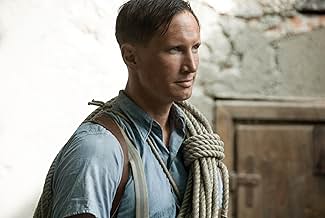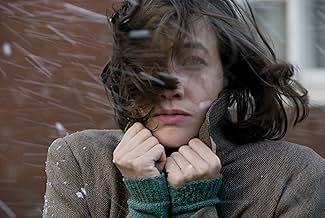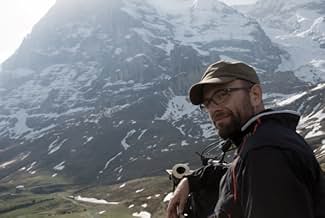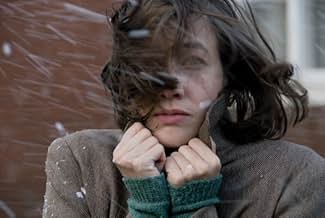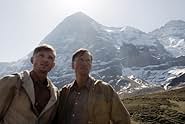Als Erster die berühmt-berüchtigte Nordwand des Eigers zu bezwingen - im Sommer 1936 ist das der Traum vieler Bergsteiger aus ganz Europa. Auch die Gedanken der beiden Kletterer - wobei Hint... Alles lesenAls Erster die berühmt-berüchtigte Nordwand des Eigers zu bezwingen - im Sommer 1936 ist das der Traum vieler Bergsteiger aus ganz Europa. Auch die Gedanken der beiden Kletterer - wobei Hinterstoißer die treibendere Kraft ist - um nichts anderes.Als Erster die berühmt-berüchtigte Nordwand des Eigers zu bezwingen - im Sommer 1936 ist das der Traum vieler Bergsteiger aus ganz Europa. Auch die Gedanken der beiden Kletterer - wobei Hinterstoißer die treibendere Kraft ist - um nichts anderes.
- Auszeichnungen
- 4 Gewinne & 7 Nominierungen insgesamt
- Hans Schlunegger
- (as Hanspeter Müller-Drossaart)
Empfohlene Bewertungen
Well, this is one exhausting, harrowing, amazing experience on film. Even the actors, acting and not actually fighting for their lives, look like they've been through hell. The filming holds back nothing on the horror of being caught in a storm on the infamous North Face of the Eiger, in the Alps. These very talented, likable chaps (even though Germans just before WWII, yes), are up against it big time. And the movie makes the most of it.
It's a simple story, and a simple structure, contrasting the comfortable press corps down below with their fireplaces and wine, against the men on the cliff, night and day. A woman and a love story are a part of it as we go, but this is more a love/hate story of men against each other, against themselves, and against the mountain, weather systems included.
It's a relief to see a movie without heroes. There is a lot of heroism, for sure, and admirable human behavior up and down. But none of the throbbing music as one or the other of the men performs an impossible feat. This is about a real life and death confrontation, and breakdown, and impossibility. Well done, well done. High frustrating and nerve wracking to watch, but well done.
The relationship between Hinterstoisser and Kurz is great. The cynical sexist reporters are great. The romantic element isn't quite as compelling. I almost wish that part gets less attention after the climb starts although it's compelling to see the juxtaposition between the comfortable resort and the harsh climb. The climb up is harrowing. It treats mountain climbing seriously where rock falls causes real injuries. This doesn't feel fake except for the girlfriend.
I think it was let down (not much) by the way the climbing theme was tied to the sub-plots. A third of the film has no mountains in it at all, which is fine, but as long as it was going to branch into another kind of film, I think I would have enjoyed more character development. The Nazi theme is brushed over as background politics, with little attempt to show disturbing things were brewing. We barely learn anything about the attitudes of the people involved in the film. I guess this may have been fear of distracting from the film's main theme, but which I think could have made the entire story and characters stronger if it were done well and believably.
Some details of these sub-plots also directly interfered with the main climbing theme, and maybe believability. eg. The love story (presumably tacked on for interest) included Luise shouting into a storm and amazingly being heard. I found this very difficult to believe -- I've been in what I thought were similar storms at high altitude (not dangling from a cliff), and had trouble screaming and being heard by people a couple of metres in front of me. Since leaving I've also read conflicting stories about the ending sequence, and although there would clearly have to be much creative licence for much of this under the circumstances, I now also wonder how much even confirmed facts have been changed to romanticise the story more.
All of this is small nitpicking, though. If you want to see some awesome cinematography it's a brilliant mountain film which makes it one of my favourite films. It's also not such a bad story if you're less pedantic than myself.
In 1936, Nazi Germany was eager to propagandize the race for "the last remaining problem in the Alps," scaling the face of the treacherous Eiger. Enter into the race dutiful Germans Toni (Benno Furmann) and Andi (Florian Lukas); the race is on with two Austrians as competitors in a climbing romance called North Face. Touching the Void (2004) was more harrowing and less boy-girl romantic, but this emphasis on non-climbing romance I can love or hate depending on how demanding I am at the moment about the purity of the climb.
The political subtext is apparent—as Germany is about to annex Austria and the Olympics are imminent, a win on the Eiger would be good for the Nazis. Much as this is a suspenseful adventure of love for climbing, based on a true story, it is also a love story, connecting climber Toni and Luise (Johanna Wolkolek), a photographer and childhood friend of both mountaineers. It is she who watches the adventurers throughout the suspenseful climb and return, kissing Toni only once.
That minimalism pervades the film as no kiss goes any further and no rappel is overly dramatized—they are what they are set against the majestic Alps and the cruel Swiss massif. (That the Eiger "ogre" waits to devour anyone who tries the North Face may be fanciful; nonetheless what happens to the best of climbers would give even the sternest skeptic reason to pause about that legend). The editing is first-rate: Never for a moment did I think it is a movie made not on location and with actors because the shots are believable and wild.
Parallel cutting to the comfortable lodge with waiting reporters, dignitaries, and telescope gawkers serves as a convenient counterpoint to the harrowing climb. At times, I wanted to throttle the insouciant ones who seemed oblivious to the life and death struggle on the mountain.
The most beautiful day I ever spent hiking was down the Jungfrau with the Eiger seemingly all around. My Facebook portrait is of me standing at a crest with that most dangerous Alpine rock face as background. I loved that day, that mountain, and this film.
Wusstest du schon
- WissenswertesAs Luise Fellner and her boss, Herr Arau, arrive at the Eiger, the local guides are standing in front of the hotel advertising their services to the tourists. One of the guides notices a pair of climbers in the crowd. "Look who's coming," he says, "Bartolo Sandri and Mario Menti." A fellow guide mutters: "Another couple of fools. Come in a train and leave in a coffin." These two Italian climbers fell to their deaths from the north face June 21, 1938.
- PatzerAt the beginning of the film, when Luisa watches the news in the cinema theater, the voice-over gets the first-names of the alpinists who died on the Eiger wrong. It says Max Mehringer and Karl Sedlmayr, but it's the opposite: KARL Mehringer and MAX Sedlmayr. This may have been intended to show the unreliability of the report.
- Zitate
[last lines]
Luise Fellner: [voiceover] All I know is that death spared me, and that Toni went away forever that day. One has lived if one has loved. There are times when I find this infinitely hard to believe. Most days I feel that I am alive. And that love is the reason for that.
Top-Auswahl
- How long is North Face?Powered by Alexa
Details
- Erscheinungsdatum
- Herkunftsländer
- Offizielle Standorte
- Sprachen
- Auch bekannt als
- North Face
- Drehorte
- Produktionsfirmen
- Weitere beteiligte Unternehmen bei IMDbPro anzeigen
Box Office
- Bruttoertrag in den USA und Kanada
- 711.421 $
- Eröffnungswochenende in den USA und in Kanada
- 23.050 $
- 31. Jan. 2010
- Weltweiter Bruttoertrag
- 6.815.056 $
- Laufzeit2 Stunden 6 Minuten
- Farbe
- Sound-Mix
- Seitenverhältnis
- 2.35 : 1
Zu dieser Seite beitragen







